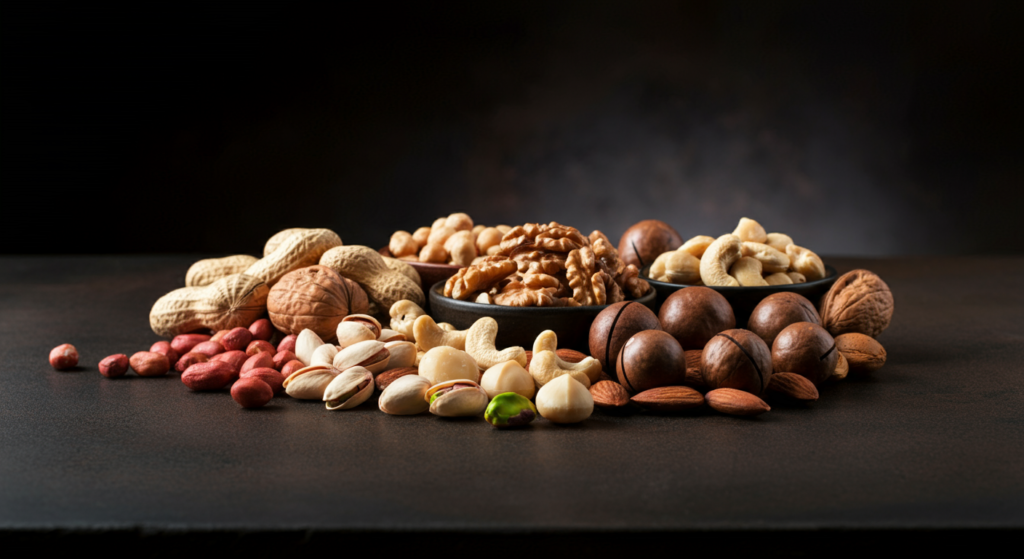Can dogs eat Nuts?
Table of Contents
Nuts and Paws: Snack Time or Trouble?
As dog owners, we’re always mindful of what’s safe for our furry friends to eat. With so many human foods carrying potential risks for dogs, it’s only natural to wonder about everyday snacks like nuts. So, can dogs eat nuts? The answer depends on the type of nut and how it’s prepared.
The answer depends on the type of nut. Some nuts are safe for dogs in small amounts, while others can be harmful or even toxic. Factors such as salt, seasonings, and choking hazards also play a significant role in determining whether nuts are a suitable treat for your dog. Let’s explore the details to ensure you’re making the best choices for your pet’s health.
What Are Nuts?
Nuts are nutrient-dense seeds or fruits encased in hard shells. Popular varieties include almonds, peanuts, walnuts, cashews, pistachios, and macadamia nuts. While they’re a great source of healthy fats, protein, and vitamins for humans, not all nuts are created equal when it comes to dogs.
In human cuisine, nuts are often roasted, salted, or flavoured, which can introduce harmful substances for dogs. Understanding the differences between nut types and preparations is crucial before offering them to your pet.

Can Dogs Eat Nuts?
The simple answer is: it depends on the nut. Some nuts, like peanuts, can be safe in moderation, while others, like macadamia nuts, are toxic to dogs. Here’s a breakdown of common nuts:
- Peanuts: Safe for dogs when unsalted, plain, and given in moderation. Avoid peanut butter with added sugar or xylitol.
- Almonds: Not toxic but difficult for dogs to digest and can pose a choking hazard.
- Walnuts: High-fat content and potential for mould, which can lead to health issues.
- Cashews: Safe in small amounts if unsalted and plain.
- Pistachios: Not toxic but high in fat and often salted, which isn’t ideal for dogs.
- Macadamia Nuts: Highly toxic to dogs and should be avoided entirely.
What Are the Benefits of Nuts for Dogs?
When prepared correctly and offered in moderation, some nuts can provide health benefits for your dog. While not necessary in their diet, these treats can deliver nutrients and support overall health. Here are some potential benefits:
- Rich in Healthy Fats
Certain nuts, like peanuts and cashews, contain monounsaturated fats that support healthy skin and a shiny coat. These fats are considered “good fats” and can be beneficial when consumed in moderation. - Source of Protein
Nuts like peanuts are rich in protein, which supports muscle maintenance and overall energy. However, protein needs are typically met through a dog’s regular diet, so additional sources should be limited. - Vitamin and Mineral Boost
Nuts can provide small amounts of essential nutrients, such as:
- Vitamin E: Promotes healthy skin and immune function.
- Magnesium: Supports muscle and nerve function.
- Iron: Aids in oxygen transport within the bloodstream.
- Antioxidant Properties
Some nuts contain antioxidants, like polyphenols and vitamin E, which can help combat oxidative stress and support a healthy immune system.
Are Nuts Bad for Dogs?
While some nuts are safe in moderation, others can cause significant health issues. Here are the primary risks:
- Toxicity
- Macadamia nuts are toxic to dogs and can cause symptoms like vomiting, weakness, tremors, and hyperthermia.
- Mouldy nuts, particularly walnuts, may contain mycotoxins that lead to seizures or neurological issues.
- High Fat Content
Most nuts are calorie-dense and high in fat. Excessive consumption can lead to:
- Obesity: Regularly eating high-fat treats contributes to weight gain.
- Pancreatitis: A painful and potentially life-threatening condition caused by high-fat diets.
- Sodium and Additives
Many nuts are salted or flavoured with ingredients harmful to dogs, such as:
- Garlic or Onion Powder: Toxic to dogs and can damage red blood cells.
- Xylitol: A sugar substitute found in some nut products that is extremely toxic to dogs.
- Choking Hazard
Whole nuts can pose a choking risk, especially for smaller dogs. Additionally, the hard shells of nuts like pistachios or almonds can cause blockages or damage teeth. - Digestive Upset
Even safe nuts can cause stomach issues if consumed in large amounts. Symptoms may include:
- Vomiting
- Diarrhoea
- Bloating or gas

How Many Nuts Can Dogs Eat?
Portion control is essential. A small dog may tolerate only one or two nuts, while larger breeds might enjoy a few more. Introduce nuts gradually and monitor for any adverse reactions, such as digestive upset or allergic symptoms.
If your dog shows signs of discomfort after eating nuts, consult your veterinarian immediately for guidance.
Fun Facts About Dogs and Nuts
- Did you know dogs in tropical regions occasionally encounter wild nut trees? While some may nibble on fallen nuts, these are usually plain and unprocessed.
- Many dogs love the taste of peanuts and peanut butter, making it a popular training reward when offered sparingly.
- Nuts have been part of human diets for thousands of years, but dogs don’t require them to thrive.
Conclusion
So, can dogs eat nuts? The answer is: some, with precautions. Always research the specific nut type, avoid toxic varieties like macadamia nuts, and serve plain, unsalted nuts in moderation. Your dog’s health and safety come first, so when in doubt, consult your veterinarian. Have you tried giving your dog nuts? Share your experience below!
FAQ: Nuts and Dogs
1. What nuts are safe for dogs to eat?
Some nuts, like plain, unsalted peanuts, cashews, and hazelnuts, can be safe for dogs in moderation. However, they should be given sparingly due to their high-fat content. Always avoid macadamia nuts, walnuts, and pecans, as they are toxic to dogs.
2. Can dogs eat cashews or almonds?
Yes, dogs can eat plain, unsalted cashews in small amounts, as they are generally safe. Almonds, however, are not toxic but can be difficult for dogs to digest, potentially leading to stomach upset or obstruction if not chewed properly.
3. Is it safe for a dog to eat a nut?
It depends on the type of nut. While some nuts like peanuts and cashews are safe in small amounts, others, such as macadamia nuts and walnuts, are highly toxic and should never be given to dogs. Always ensure the nuts are plain, unsalted, and free of coatings like chocolate or spices.
4. What happens if a dog eats a handful of nuts?
Eating a handful of nuts can lead to various issues depending on the type of nuts consumed. If the nuts are toxic, such as macadamia nuts or walnuts, your dog could experience symptoms like vomiting, weakness, or tremors. Even safe nuts in large quantities can cause digestive upset, pancreatitis, or weight gain due to their high fat content. If your dog eats a large amount of nuts, contact your veterinarian immediately.
